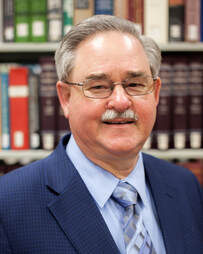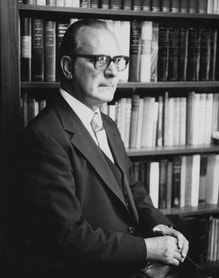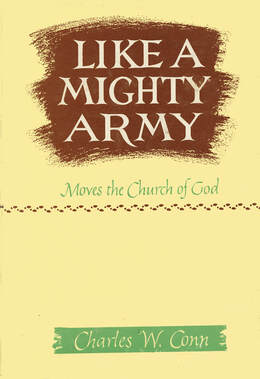CHURCH OF GOD HISTORIAN
The Church of God International Executive Council established the office of church historian with the appointment of Charles W. Conn in 1977 to honor the publication of the second edition of Like a Mighty Army. In 2004, the Church God International Executive Committee appointed David G. Roebuck as Church of God historian.
 David G. Roebuck
David G. Roebuck
David G. Roebuck (Curriculum Vitae)
David G. Roebuck is an ordained bishop in the Church of God, and he has served as director of the Dixon Pentecostal Research Center since 1997. He is an assistant professor of the history of Christianity at Lee University and an adjunct teacher at the Pentecostal Theological Seminary where he has taught the Church of God History and Polity course since 1992.
Roebuck earned a B.A. from West Coast Christian College and a M.Div. from the Pentecostal Theological Seminary, as well as a M.A. and Ph.D. from Vanderbilt University. His Ph.D. is in the history of Christianity, and his dissertation was “Limiting Liberty: The Church of God and Women Ministers, 1886-1996.”
Roebuck’s research interests include the holiness and Pentecostal movements with attention to minority voices. He currently edits the “Church of God Chronicles” and “Where Are They Now” columns for the Church of God Evangel. His curriculum vitae lists many of his publications and presentations.
David Roebuck is married to Kim Freeman Roebuck and has two adult children: William, married to Liz, and Beth, married to Jason. He is the proud grandfather of Allyssia, Opal, Nora, and Theodore.
David G. Roebuck is an ordained bishop in the Church of God, and he has served as director of the Dixon Pentecostal Research Center since 1997. He is an assistant professor of the history of Christianity at Lee University and an adjunct teacher at the Pentecostal Theological Seminary where he has taught the Church of God History and Polity course since 1992.
Roebuck earned a B.A. from West Coast Christian College and a M.Div. from the Pentecostal Theological Seminary, as well as a M.A. and Ph.D. from Vanderbilt University. His Ph.D. is in the history of Christianity, and his dissertation was “Limiting Liberty: The Church of God and Women Ministers, 1886-1996.”
Roebuck’s research interests include the holiness and Pentecostal movements with attention to minority voices. He currently edits the “Church of God Chronicles” and “Where Are They Now” columns for the Church of God Evangel. His curriculum vitae lists many of his publications and presentations.
David Roebuck is married to Kim Freeman Roebuck and has two adult children: William, married to Liz, and Beth, married to Jason. He is the proud grandfather of Allyssia, Opal, Nora, and Theodore.
 Charles W. Conn
Charles W. Conn
Charles W. Conn
Charles W. Conn (1920-2008) wrote the most substantial history of the Church of God in 1955 entitled Like a Mighty Army, Moves the Church of God, 1886-1955. Commissioned by the International Executive Council, Like a Mighty Army quickly became the standard history of the Church of God. Conn revised Like a Mighty Army in 1977 and again in 1996; and Pathway Press published a “Tribute Edition” in 2008 with the addition of “Charles W. Conn: A Life” penned by Charles Paul Conn with Charles Brian Conn. Like a Mighty Army has been read widely by Church of God members and ministers and is the regular text for Church of God history at Lee University and the Pentecostal Theological Seminary. Hundreds of university and public libraries have added the book to their collections.
When Conn revised Like a Mighty Army in 1977, the International Executive Council designated him as the Church of God’s “first official Church Historian.” It then reaffirmed his designation as “Historian of the Church of God” with the third edition in 1996.
Charles W. Conn (1920-2008) wrote the most substantial history of the Church of God in 1955 entitled Like a Mighty Army, Moves the Church of God, 1886-1955. Commissioned by the International Executive Council, Like a Mighty Army quickly became the standard history of the Church of God. Conn revised Like a Mighty Army in 1977 and again in 1996; and Pathway Press published a “Tribute Edition” in 2008 with the addition of “Charles W. Conn: A Life” penned by Charles Paul Conn with Charles Brian Conn. Like a Mighty Army has been read widely by Church of God members and ministers and is the regular text for Church of God history at Lee University and the Pentecostal Theological Seminary. Hundreds of university and public libraries have added the book to their collections.
When Conn revised Like a Mighty Army in 1977, the International Executive Council designated him as the Church of God’s “first official Church Historian.” It then reaffirmed his designation as “Historian of the Church of God” with the third edition in 1996.

Following the publication of Like A Mighty Army, Conn wrote other historical books including: An Evangel Reader: Selections from the Church of God Evangel, 1910-1958 (1958); Where the Saints Have Trod: A History of Church of God World Missions (1959); Cradle of Pentecost: A History of the North Cleveland Church of God (1981); Our First 100 Years, 1886-1986: A Retrospective (1986); and Images of a People: An Album of Church of God History (1986). Additionally, Conn produced a video series, “Conversations on Camera with Charles W. Conn,” in which he interviewed nearly one hundred Church of God leaders.
Along with his historical writing, Conn served as editor of the Lighted Pathway from 1948-1952, as editor in chief of Church of God publications from 1952 to 1962, and published numerous other books. For half a century, Conn symbolized literary and historical writing in the Church of God. Additionally, he served the Church of God in various capacities including assistant general overseer (1962-1966), general overseer (1966-1970), president of Lee College (1970-1982), and state overseer of Virginia (1982-1984).
As the centennial of the Church of God approached, the denomination created a Centennial Commission in 1981 and appointed Conn as chair. That commission became the Church of God Historical Commission, which continues to serve today. One of the chief objectives of the Historical Commission is to encourage research, writing, and publication of materials related to the history of the Church of God. In 2000, the Historical Commission recommended and the International Executive Council approved the Charles W. Conn Historical Writing Award to honor Conn for his numerous historical publications, to draw attention to excellent works of history, and to encourage others to undertake the important task of communicating our heritage. The Historical Commission grants an award each General Assembly period for article-length and book-length publications.
The Dixon Pentecostal Research Center also serves as a lasting legacy of Charles W. Conn. The center began as a special collection in the Lee College Library in 1971. Library Director LeMoyne Swiger and her staff previously had assembled a small collection of books by Church of God authors. When Conn became president of Lee College in 1970, he saw the potential of developing a more extensive collection of materials related to the global Pentecostal Movement. At that time, there were very few Pentecostal scholars or even outsiders interested in the movement. Lee College created the Pentecostal Research Center, raised a modest budget, moved its Pentecostal books into a small room, and hired a part-time director. Today the Dixon Pentecostal Research Center is one of the world’s most significant collections of Pentecostal resources as well as the archives of the Church of God. According to Charles W. Conn’s original vision, the purpose of the Pentecostal Research Center is “to preserve for future generations those things of the past that have made us what we are.”
Along with his historical writing, Conn served as editor of the Lighted Pathway from 1948-1952, as editor in chief of Church of God publications from 1952 to 1962, and published numerous other books. For half a century, Conn symbolized literary and historical writing in the Church of God. Additionally, he served the Church of God in various capacities including assistant general overseer (1962-1966), general overseer (1966-1970), president of Lee College (1970-1982), and state overseer of Virginia (1982-1984).
As the centennial of the Church of God approached, the denomination created a Centennial Commission in 1981 and appointed Conn as chair. That commission became the Church of God Historical Commission, which continues to serve today. One of the chief objectives of the Historical Commission is to encourage research, writing, and publication of materials related to the history of the Church of God. In 2000, the Historical Commission recommended and the International Executive Council approved the Charles W. Conn Historical Writing Award to honor Conn for his numerous historical publications, to draw attention to excellent works of history, and to encourage others to undertake the important task of communicating our heritage. The Historical Commission grants an award each General Assembly period for article-length and book-length publications.
The Dixon Pentecostal Research Center also serves as a lasting legacy of Charles W. Conn. The center began as a special collection in the Lee College Library in 1971. Library Director LeMoyne Swiger and her staff previously had assembled a small collection of books by Church of God authors. When Conn became president of Lee College in 1970, he saw the potential of developing a more extensive collection of materials related to the global Pentecostal Movement. At that time, there were very few Pentecostal scholars or even outsiders interested in the movement. Lee College created the Pentecostal Research Center, raised a modest budget, moved its Pentecostal books into a small room, and hired a part-time director. Today the Dixon Pentecostal Research Center is one of the world’s most significant collections of Pentecostal resources as well as the archives of the Church of God. According to Charles W. Conn’s original vision, the purpose of the Pentecostal Research Center is “to preserve for future generations those things of the past that have made us what we are.”
